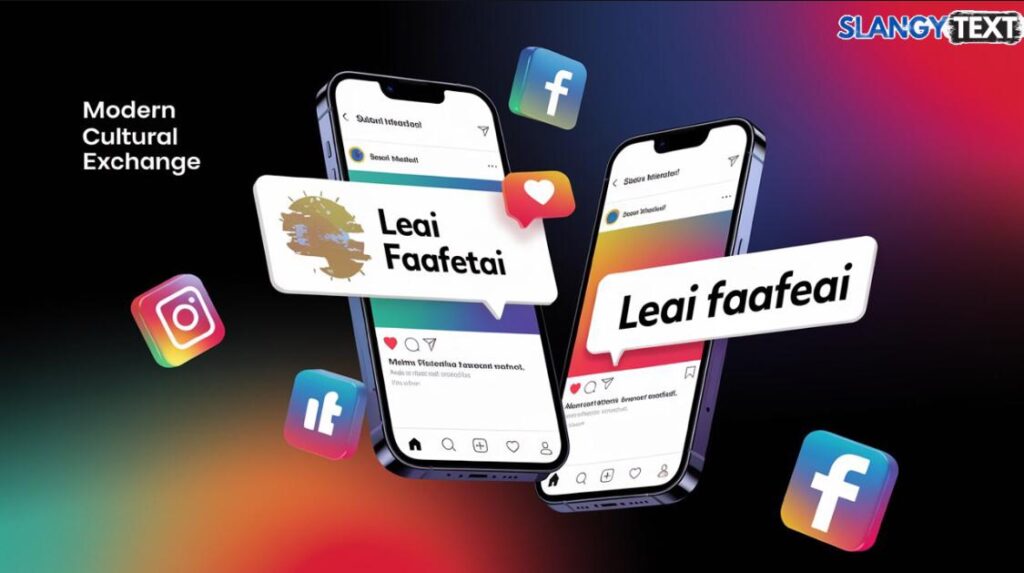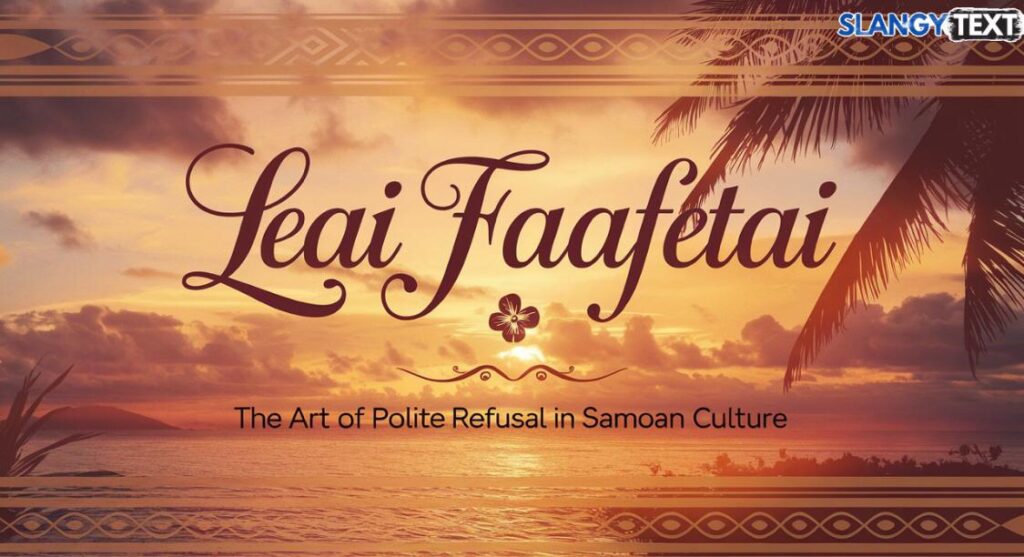The Samoan phrase “leai faafetai” has become increasingly prevalent in modern communication, particularly as cultural exchanges continue to flourish through social media platforms like TikTok and Instagram.
This phrase, which essentially means “no thank you” in the Samoan language, carries a depth of cultural significance that extends far beyond its literal translation
The Cultural Significance of Samoan Phrases
In Samoan culture, expressing gratitude and respect holds paramount importance. The word “faafetai” alone means “thank you,” while “leai” means “no.” When combined, these words create a polite way to decline offers or requests while maintaining cultural respect and courtesy.
Common Usage Scenarios in Digital Communication
The rise of WhatsApp and social media has transformed how people use Samoan phrases globally. Here’s a table showing common digital scenarios where “leai faafetai” is frequently used:
| Situation | User | Response Example |
|---|---|---|
| Group Chat Invitation | Sarah Thompson | “Leai faafetai, I have prior commitments” |
| Online Shopping Offer | Michael Chen | “Leai faafetai, not interested in the deal” |
| Event RSVP | Isabella Rodriguez | “Leai faafetai, can’t make it this time” |
| Game Request | James Wilson | “Leai faafetai, taking a break from gaming” |
| Social Media Challenge | Emma Davis | “Leai faafetai, not participating in challenges” |
| Collaboration Request | William Brown | “Leai faafetai, my schedule is full” |
| Product Promotion | Olivia Martinez | “Leai faafetai, not promoting products currently” |
| Survey Participation | Daniel Lee | “Leai faafetai, too busy for surveys” |
| Beta Testing Invite | Sophie Anderson | “Leai faafetai, not testing new apps” |
| Newsletter Subscription | Nathan Taylor | “Leai faafetai, managing email volume” |
Must visit : What Does Moreno Mean (With Examples)
Professional Email Communication Examples
In professional settings, using “leai faafetai” can add a unique cultural touch while maintaining professionalism. Here’s how different professionals incorporate it:
| Sender | Context | Email Example |
|---|---|---|
| Robert Johnson | Job Offer | “Leai faafetai, I’ve accepted another position” |
| Amanda White | Project Proposal | “Leai faafetai, our team is at capacity” |
| David Miller | Speaking Engagement | “Leai faafetai, my schedule conflicts” |
| Jennifer Garcia | Partnership Request | “Leai faafetai, not seeking partnerships” |
| Christopher Lee | Investment Opportunity | “Leai faafetai, not investing currently” |
| Michelle Wong | Vendor Proposal | “Leai faafetai, have existing supplier” |
| Kevin Patel | Conference Invitation | “Leai faafetai, unable to travel” |
| Rachel Cohen | Consulting Request | “Leai faafetai, fully booked” |
| Thomas Anderson | Board Position | “Leai faafetai, other commitments” |
| Lauren Martinez | Mentorship Request | “Leai faafetai, limited availability” |
Expressing Polite Refusal in Social Settings

The art of polite denial becomes easier with phrases like “leai faafetai.” Understanding various social contexts helps in appropriate usage:
| Social Scenario | Person | Polite Response |
|---|---|---|
| Alexandra King | Party Invitation | “Leai faafetai, family commitments” |
| Brandon Torres | Food Offering | “Leai faafetai, just finished eating” |
| Catherine Wu | Dance Request | “Leai faafetai, resting my feet” |
| Derek Phillips | Drink Offer | “Leai faafetai, driving tonight” |
| Elizabeth Nash | Shopping Invite | “Leai faafetai, on a budget” |
| Frank Rogers | Game Night | “Leai faafetai, early morning tomorrow” |
| Grace Kim | Movie Plans | “Leai faafetai, seen it already” |
| Henry Carter | Group Travel | “Leai faafetai, saving vacation days” |
| Isabel Santos | Gym Partner Request | “Leai faafetai, have a trainer” |
| Jack Wilson | Blind Date Setup | “Leai faafetai, not dating currently” |
Cultural Expressions in Modern Settings
Understanding cultural expressions like “leai faafetai” has become increasingly important in our interconnected world. The phrase represents more than just a simple refusal; it embodies the essence of Samoan greeting customs and politeness in declining offers.
Digital Platform Usage Patterns
Modern social media platforms like TikTok have become cultural exchange hubs where phrases like “leai faafetai” gain international recognition. Here’s how different users employ this phrase:
| Platform | User | Context Example |
|---|---|---|
| Ashley Parker | TikTok | “Leai faafetai trending response” |
| Benjamin Foster | “Story reply with cultural respect” | |
| Charlotte Reed | “Group chat declination” | |
| Dylan Matthews | “Event invitation response” | |
| Evelyn Wright | “Professional networking reply” | |
| Felix Henderson | “Brief cultural exchange” | |
| Georgia Barnes | Snapchat | “Quick friendly decline” |
| Harrison Wells | YouTube | “Comment section interaction” |
| Iris Coleman | “Collaboration decline” | |
| Julian Morgan | Discord | “Gaming session decline” |
You might also like : What Does TMB Mean in Text (With Examples)
Business Communication Nuances

In professional settings, incorporating Samoan phrases can demonstrate cultural awareness while maintaining clear communication. The following examples show various business contexts:
| Industry | Professional | Usage Example |
|---|---|---|
| Kyle Richards | Finance | “Investment proposal decline” |
| Luna Martinez | Healthcare | “Schedule adjustment request” |
| Mason Turner | Education | “Course enrollment response” |
| Nina Patel | Technology | “Project collaboration reply” |
| Oscar Fleming | Retail | “Vendor partnership response” |
| Penny Howard | Marketing | “Campaign participation decline” |
| Quinn Foster | Legal | “Client intake response” |
| Riley Cooper | Consulting | “Service inquiry reply” |
| Samuel Chang | Real Estate | “Property viewing decline” |
| Taylor Brooks | Entertainment | “Casting opportunity response” |
Expressing Gratitude While Declining
The art of combining gratitude with polite refusal makes “leai faafetai” particularly useful in delicate situations. Here’s how various professionals handle such scenarios:
| Scenario | Person | Graceful Decline Example |
|---|---|---|
| Uma Patel | Client Meeting | “Appreciate the offer, but leai faafetai” |
| Victor Rodriguez | Team Event | “Thoughtful invitation, leai faafetai” |
| Wendy Chen | Project Proposal | “Considered carefully, leai faafetai” |
| Xavier Thompson | Partnership Offer | “Valuable opportunity, leai faafetai” |
| Yara Santos | Training Session | “Kind suggestion, leai faafetai” |
| Zach Miller | Mentorship Request | “Honored by request, leai faafetai” |
| Alice Newman | Conference Speaking | “Grateful consideration, leai faafetai” |
| Blake Patterson | Research Collaboration | “Interesting proposal, leai faafetai” |
| Chloe Bennett | Workshop Invitation | “Appreciate inclusion, leai faafetai” |
| Drew Harper | Advisory Role | “Thoughtful offer, leai faafetai” |
Social Interactions and Cultural Respect
The phrase “leai faafetai” exemplifies the importance of polite denial in maintaining harmonious relationships. Understanding its proper usage enhances social interactions:
| Setting | Individual | Respectful Decline |
|---|---|---|
| Eleanor White | Dinner Party | “Warmly decline with respect” |
| Finn Sullivan | Community Event | “Culturally appropriate refusal” |
| Grace Reynolds | Wedding Invitation | “Polite attendance decline” |
| Hugo Martinez | Family Gathering | “Respectful absence notice” |
| Ivy Peterson | Social Club | “Membership offer decline” |
| Jake Anderson | Volunteer Work | “Activity participation decline” |
| Kiera Thomas | Charity Event | “Donation request response” |
| Liam Foster | Sports Team | “Team joining decline” |
| Mia Johnson | Art Exhibition | “Opening night regrets” |
| Noah Carter | Book Club | “Meeting attendance decline” |
Understanding Context in Refusals
The effectiveness of using “leai faafetai” lies in understanding the proper context for social interactions. Here’s how different contexts affect usage:
| Context | Person | Appropriate Usage |
|---|---|---|
| Oliver Wright | Formal Event | “Professional context decline” |
| Paige Edwards | Casual Meetup | “Informal gathering response” |
| Quinn Martinez | Business Lunch | “Professional meal decline” |
| Ryan Cooper | Team Building | “Group activity response” |
| Sofia Garcia | Cultural Festival | “Event participation decline” |
| Tyler Robinson | Workshop | “Learning opportunity decline” |
| Uma Thompson | Networking | “Connection request response” |
| Vincent Lee | Conference | “Speaking engagement decline” |
| Whitney Chen | Seminar | “Attendance confirmation decline” |
| Xavier Brooks | Training | “Development opportunity decline” |
Also like to know this : What Does No Mames Wey Mean (With Example)
Modern Messaging Applications
The integration of Samoan language phrases like “leai faafetai” into texting culture has created new dimensions of cultural expression. Modern communication platforms have embraced these cultural elements, making them accessible to global users.
WhatsApp Communication Patterns
WhatsApp has become a primary platform for cross-cultural communication. Here’s how users incorporate “leai faafetai” in their daily messages:
| Scenario | User | Message Example |
|---|---|---|
| Aaron Foster | Group Invite | “Appreciate the add, leai faafetai” |
| Bethany Wells | Event Planning | “Can’t join tomorrow, leai faafetai” |
| Cameron Lee | Study Group | “Missing this session, leai faafetai” |
| Diana Ross | Family Chat | “Skip this gathering, leai faafetai” |
| Ethan Morris | Work Group | “Pass on overtime, leai faafetai” |
| Fiona Clark | Friend Circle | “Rain check needed, leai faafetai” |
| George Wilson | Sports Team | “Sitting this game out, leai faafetai” |
| Hannah Baker | Book Club | “Missing next week, leai faafetai” |
| Ian Brooks | Fitness Group | “Skip this workout, leai faafetai” |
| Jessica Chen | Dance Class | “Can’t make it today, leai faafetai” |
Cultural Sensitivity in Business
Understanding cultural expressions like “leai faafetai” enhances professional relationships. Modern businesses increasingly value cultural competency in communication.
International Business Applications
The use of “leai faafetai” in global business settings demonstrates respect for cultural diversity:
| Business Context | Professional | Response Example |
|---|---|---|
| Keith Palmer | Merger Talk | “Respectfully declining offer” |
| Laura Zhang | Joint Venture | “Not pursuing partnership” |
| Marcus Reid | Investment | “Passing on opportunity” |
| Nina Thompson | Acquisition | “Maintaining independence” |
| Oscar Martinez | Franchise | “Not expanding currently” |
| Patricia Lee | Distribution | “Alternative arrangements” |
| Quincy Adams | Licensing | “Different direction chosen” |
| Rachel Morgan | Partnership | “Solo venture preferred” |
| Samuel Kim | Alliance | “Independent path selected” |
| Tara Wilson | Collaboration | “Internal focus maintained” |
Digital Platform Integration
Social media platforms like Instagram have become cultural melting pots where phrases like “leai faafetai” gain widespread usage:
| Platform Feature | User | Usage Context |
|---|---|---|
| Ursula Grant | Stories | “Event decline update” |
| Vincent Chen | Direct Message | “Collaboration pass” |
| Wendy Park | Comment | “Challenge decline” |
| Xavier Lopez | Live Stream | “Guest appearance decline” |
| Yasmine Ali | Reel | “Trend participation pass” |
| Zack Morris | Group Chat | “Meetup decline” |
| Amy Rodriguez | Poll | “Vote participation” |
| Brian Taylor | Feature | “Mention response” |
| Cara Thomas | Highlight | “Memory share decline” |
| Derek Phillips | Thread | “Discussion opt-out” |
Workplace Communication Evolution
The integration of cultural phrases in professional settings reflects evolving workplace dynamics:
| Department | Manager | Communication Style |
|---|---|---|
| Elena Fisher | HR | “Benefits decline response” |
| Frank Woods | IT | “System update delay” |
| Gloria Ramirez | Marketing | “Campaign participation pass” |
| Henry Chang | Finance | “Budget revision decline” |
| Iris Walker | Operations | “Process change delay” |
| Jack Thompson | Sales | “Meeting reschedule notice” |
| Kelly Martinez | Legal | “Review postponement” |
| Lucas Bennett | Research | “Study participation decline” |
| Maria Santos | Design | “Project involvement pass” |
| Nathan Cole | Development | “Feature implementation delay” |
Future Trends in Cultural Communication

The evolution of polite refusal expressions continues to shape modern communication:
| Trend | Innovator | Application Example |
|---|---|---|
| Oliver Reed | AI Integration | “Automated response systems” |
| Penny Shaw | Virtual Reality | “Immersive cultural learning” |
| Quinn Foster | Blockchain | “Cultural token systems” |
| Riley Thompson | IoT | “Smart cultural responses” |
| Sara Wilson | Mixed Reality | “Cultural gesture translation” |
| Tom Anderson | Neural Networks | “Context-aware responses” |
| Uma Patel | Cloud Computing | “Cultural database access” |
| Victor Lee | Edge Computing | “Real-time cultural advice” |
| Wendy Zhang | Quantum Computing | “Complex cultural modeling” |
| Xavier Brown | 5G Networks | “Instant cultural translation” |
Embracing Cultural Understanding
The phrase “leai faafetai” exemplifies how cultural expressions enrich modern communication. Its integration into various platforms and contexts demonstrates the evolving nature of global interaction. Understanding and properly using such phrases helps build stronger, more respectful relationships across cultural boundaries.
The future of cross-cultural communication continues to evolve, with technology playing an increasingly important role in preserving and promoting cultural expressions. As social interactions become more digital, the importance of maintaining cultural authenticity and respect through proper usage of phrases like “leai faafetai” becomes ever more crucial.
Conclusion
First and foremost, the Samoan phrase “leai faafetai” has undeniably transformed from a simple expression of polite refusal into a globally recognized cultural phenomenon. Additionally, its integration into modern digital platforms has consequently led to its widespread adoption across various social and professional contexts. Furthermore, while maintaining its core meaning of “no thank you,” the phrase has subsequently evolved to encompass deeper cultural significance. Moreover, its versatility in both casual and formal settings has therefore made it an invaluable tool for cross-cultural communication. Meanwhile, as social media platforms continue to bridge cultural gaps, phrases like “leai faafetai” are increasingly becoming essential in fostering respectful international dialogue.
Subsequently, this cultural exchange has not only enriched global communication but has also, as a result, promoted greater understanding and appreciation of Samoan culture. In conclusion, the journey of “leai faafetai” from a traditional Samoan expression to a widely used phrase ultimately demonstrates how language adapts and thrives in our interconnected world, thus proving that cultural expressions can transcend their original contexts while still preserving their fundamental meaning and respect.
Must visit : FYSA Meaning

Kayla Rogers is a writer at Slangy Text who loves exploring modern acronyms & slangs and how they shapes our conversations. She enjoys sharing fun and interesting articles that connect with readers. When she’s not writing, Kayla likes to keep up with the latest trends or relax with a good book.







